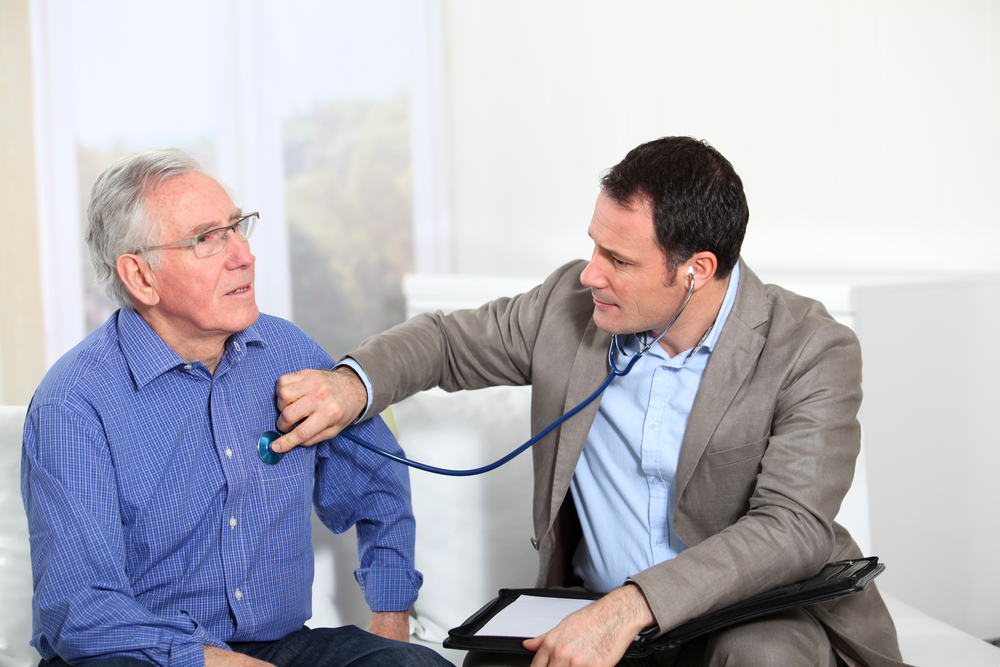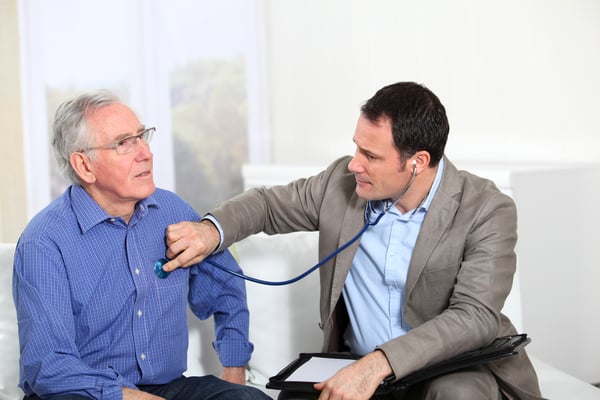February is National Cancer Prevention month! Read on to learn some simple steps that can be taken to reduce the risk of cancer in seniors.
9 Steps for Cancer Prevention
The most significant risk factor for the development of cancer is aging. However, the risk of many types of cancer can be drastically reduced by focusing on prevention steps. Several factors play a role in cancer development, such as heredity, but many can be voluntarily avoided.
- Don’t smoke and avoid exposure to smoke. Smoking is the most significant cancer risk factor. It is to blame for lung, and many other types of cancer. The best way to help prevent cancer is to quit smoking or never start. As soon as you quit, the body positively responds ─ so it's never too late. Avoiding secondhand smoke also helps to prevent cancer, because this smoke contains more than 60 known carcinogens. These carcinogens interrupt normal cell development, a catalyst for cancer development.
- Stay safe in the sun and watch for skin changes. Each year, over one million Americans are diagnosed with skin cancer. It is the most common cancer and accounts for about half of all cancer diagnoses, yet it’s one of the most preventable types of cancer. Reduce UV ray exposure by wearing sunscreen and protective clothing, and avoiding the mid-day sun and tanning beds.
- Eat plenty of fruits and vegetables. A diet rich in fruits and vegetables greatly reduces the risk of developing cancer and many other conditions. Fruits and vegetables contain antioxidants, which help repair our damaged cells. Green, orange, and yellow fruits and vegetables are your best bet to help prevent cancer. Studies also show that dark fruits, like blueberries and grapes, may also have anti-cancer properties. Cruciferous vegetables such as broccoli, cauliflower, bok choy, Brussels sprouts, and cabbage are particularly helpful, according to numerous studies.
- Limit red meat and animal fat. A diet high in animal fat increases the risk for several types of cancer, particularly colon cancer. Red meat contains much more fat than poultry and fish, so reducing the amount of red meat in your diet may help to prevent cancer. A diet high in fat also is a major cause of obesity, which is another risk factor for many types of cancer.
- Limit alcohol intake. Drinking excessive amounts of alcohol regularly increases the risk for many kinds of cancer. Studies suggest that men who consume two alcoholic drinks per day and women who have one alcoholic drink per day can significantly increase their risk factors for certain types of cancer.
- Exercise. When you exercise, you are reducing your risk for many types of cancer. The American Cancer Society recommends exercising 30 minutes or more, at least 5 days a week for cancer prevention. Always check with your physician before embarking on any exercise program.
- Know your environment. Exposure to chemicals may increase the risk of developing many types of cancer, including kidney cancer and bladder cancer. If you are exposed to fumes, dust, chemicals, and the like, you may want to look into ways to reduce or eliminate your exposure. Gasoline, diesel exhaust, arsenic, beryllium, vinyl chloride, nickel chromates, coal products, mustard gas, and chloromethyl ethers are all dangerous carcinogens.
- Be familiar with your personal and family medical history. Cancers such as breast, colon, ovarian, and other types can be hereditary. If certain cancers run in your family, tell your doctor so that he or she can recommend the right screenings and assess your true risk. Genetic testing and counseling may be encouraged based on a family’s medical history.
- Get regular cancer screens. Cancer screening tests can be useful in detecting cancer ─ and preventing it. The colonoscopy and Pap smear can detect abnormal cellular changes before they turn cancerous. The key to their effectiveness is that they are done regularly. Other tests may be useful for early detection, but not necessarily cancer prevention. It is common to have prostate cancer screening through digital rectal exams, and prostate specific antigen (PSA) tests can help detect prostate cancer early. Mammograms and other imaging tools are also recommended to detect breast cancer, and the survival rate continues to grow.
Cancer Screenings for Seniors: An Ongoing Controversy
Screening means checking your body for cancer before you have symptoms. Malignancies respond to treatment more effectively when discovered and diagnosed in the early stages of development, which is why someone may opt to get screened regularly for various types of cancer. Here are the typical screening recommendations for seniors age 65 or older, and Medicare may cover them:
FOR MEN:
Prostate Cancer Testing
Overall health status – not just age – is important when deciding about prostate cancer testing. Men who can expect to live at least 10 more years should talk with a doctor about the uncertainties, risks, and potential benefits of testing so they can decide if they want to be tested.
FOR WOMEN:
Breast Cancer Testing
If there are any changes in how breasts appear or feel, report it to a doctor immediately. Get a mammogram every two years, or choose to get one every year. Be sure to understand the pros and cons of breast cancer screening. When deciding how often to screen for breast cancer, consider whether you are at higher than average risk for breast cancer. If you are, talk to a health care provider about whether you need to get other tests done along with your mammograms.
Cervical Cancer Testing
For women age 65 or older, many medical professionals believe that no further testing is needed if you’ve had regular cervical cancer testing with normal results during the past 10 years. No testing is needed after a hysterectomy that removed the uterus and cervix, if it was done for reasons not related to cervical cancer.
Women with a history of a serious cervical pre-cancer should continue testing for 20 years after that diagnosis.
FOR ALL:
Colon Cancer Testing
Testing is recommended, and there are many testing options. Talk with a doctor about which tests are best for you and how often testing should be done.
Lung Cancer Testing
If you have a history of smoking, consult with a health care provider about whether you should get an annual low-dose CT scan to screen for early lung cancer. Screening may benefit you if you are an active or former smoker (quit within the past 15 years), have no signs of lung cancer, and have had a single pack of cigarettes per day per year, or its equivalent. For example, one pack per day for 30 years is equal to two packs per day for 15 years. Discuss the benefits, limitations, and risks of screening with a medical professional before testing is done.
When to Stop Screenings: The Debate Among Doctors and Specialists
There are few clinical trials that include older patients, creating a lack of data about the effectiveness and possible harms of cancer screening in the senior population. This results in a variation in recommendations, especially in regard to when it’s time to stop screening. The problem is that guidelines are too often based on younger patients, and do not always consider individual variations in life expectancy, co-morbid conditions, functional status, or personal preference. That said, medical societies and other expert groups may recommend:
- Stop routine Pap smears to screen for cervical cancer at age 65, if they have been negative in the past.
- Stop routine screening mammography for women at average risk of breast cancer after age 75.
- Stop screening colonoscopies for adults at average risk of colorectal cancer at age 75.
- Stop routine screening using a blood test that measures the amount of prostate-specific antigen (PSA) in the blood, when there is average risk at any age. PSA is a protein produced by the prostate gland.
Many doctors ignore these guidelines – again, because cancer screening recommendations based on age alone can be too arbitrary. A frail 75-year-old with heart disease and diabetes is different from a robust 75-year-old who exercises every day, so many experts suggest considering a person’s life expectancy. If it is less than 10 years, cancer screening is unlikely to improve a person’s survival or quality of life, and the risks of screening could be greater than the benefits. However, since life expectancy can be difficult to predict, doctors hesitate to halt screenings for many of their patients.
A decision about cancer screening should be mutually agreed upon by you and your doctor. Due to differing approaches within the medical community, you and your doctor should discuss the pros and cons when it comes to cancer screening. Getting screening tests regularly may find cancers early, when treatment is most likely to work – but it is also important to be well informed about the risks of any test, and about what will happen if a test suggests there may be cancer that won’t shorten your life.
Comfort Keepers® can help. Our caregivers can help establish a daily routine that promotes good health and independent living. We can also make sure that he or she has transportation to and from medical appointments. Call your local office today to find out about all of the services that we can provide.
Links to Other cancers that impact Seniors
RN Care Management
RN Care Management helps seniors develop and execute a cancer recovery, prevention, and screening plan. There are facts that show people recovering from certain types of cancers more effectively with the assistance of a nurse. The final section of this Case Management Research Report demonstrates the effectiveness of Case Management on cancer. Adherence to protocols would stand out as the area where patients noticed the most benefit both emotionally and physically.
Comfort Keepers® can help. Comfort Keepers®’ Interactive Caregiving™ keeps senior clients engaged physically, mentally, and emotionally while living independently at home. Caregivers can also help support a healthier diet and lifestyle for your loved one.
References:
A Place for Mom. “Cancer Screening Timelines for Boomers and Seniors” by Dana Larsen. Web. 2016.
Harvard Health Publications.“Many Seniors Get Unnecessary and Potentially Harmful Cancer Tests” by Howard LeWine, M.D. Web. 2014.
American Cancer Society. “Cancer Screening Guidelines by Age.” Web. 2016.
National Institutes of Health (NIH). “Preventive Cancer Care for the Elderly”. Web. 2015.
LifestyleOptions.com. “Cancer Care in the Elderly”. Web. 2015.
American Cancer Society. “Prevention Studies for a Cancer-Free Tomorrow”. Web 2015.
Centers for Disease Control (CDC). “Current Cigarette Smoking Among Adults in the United States”. Web. 2014.






